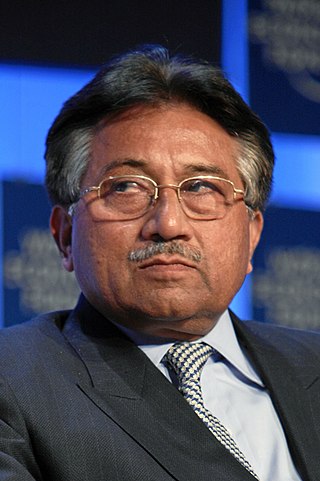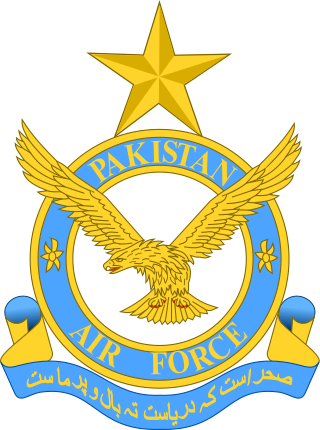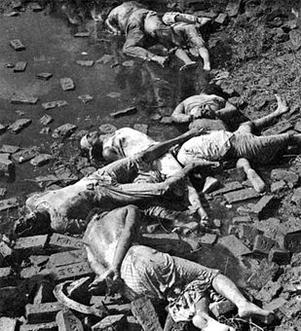
Pakistan competed at the 2011 World Aquatics Championships in Shanghai, China between July 16 and 31, 2011.

Pakistan competed at the 2011 World Aquatics Championships in Shanghai, China between July 16 and 31, 2011.
Pakistan qualified 3 swimmers. [1]
| Athlete | Event | Heats | Semifinals | Final | |||
|---|---|---|---|---|---|---|---|
| Time | Rank | Time | Rank | Time | Rank | ||
| Israr Hussain | Men's 50m Freestyle | 27.03 | 80 | did not advance | |||
| Men's 100m Freestyle | 57.69 | 83 | did not advance | ||||
| Athlete | Event | Heats | Semifinals | Final | |||
|---|---|---|---|---|---|---|---|
| Time | Rank | Time | Rank | Time | Rank | ||
| Kiran Khan | Women's 50m Backstroke | 33.18 | 51 | did not advance | |||
| Women's 50m Butterfly | 30.50 | 38 | did not advance | ||||
| Anum Bandey | Women's 200m Breaststroke | 2:58.85 | 38 | did not advance | |||
| Women's 400m IM | 5:37.11 | 36 | did not advance | ||||

Karachi is the capital city of the Pakistani province of Sindh. It is the largest city in Pakistan and 12th largest in the world, with a population of over 20 million. It is situated at the southern tip of the country along the Arabian Sea coast and formerly served as the country's capital from 1947 to 1959. Ranked as a beta-global city, it is Pakistan's premier industrial and financial centre, with an estimated GDP of over $200 billion (PPP) as of 2021. Karachi is a metropolitan city and is considered Pakistan's most cosmopolitan city, and among the country's most linguistically, ethnically, and religiously diverse regions, as well as one of the country's most progressive and socially liberal cities.

Osama bin Laden was a Saudi Arabian–born Islamist dissident and militant leader who was the founder and first general emir of al-Qaeda. Ideologically a pan-Islamist, Bin Laden participated in the Afghan mujahideen against the Soviet Union, and supported the Bosnian mujahideen during the Yugoslav Wars. Opposed to the United States' foreign policy in the Middle East, Bin Laden declared war on the U.S. in 1996 and advocated attacks targeting US assets in various countries, and supervised the execution of September 11 attacks inside the U.S. in 2001.

Pakistan, officially the Islamic Republic of Pakistan, is a country in South Asia. It is the fifth-most populous country, with a population of over 241.5 million, having the second-largest Muslim population as of 2023. Islamabad is the nation's capital, while Karachi is its largest city and financial centre. Pakistan is the 33rd-largest country by area. Bounded by the Arabian Sea on the south, the Gulf of Oman on the southwest, and the Sir Creek on the southeast, it shares land borders with India to the east; Afghanistan to the west; Iran to the southwest; and China to the northeast. It shares a maritime border with Oman in the Gulf of Oman, and is separated from Tajikistan in the northwest by Afghanistan's narrow Wakhan Corridor.

Pervez Musharraf was a Pakistani military officer and politician who served as the tenth president of Pakistan from 2001 to 2008.

Since the Partition of British India in 1947 and subsequent creation of the dominions of India and Pakistan, the two countries have been involved in a number of wars, conflicts, and military standoffs. A long-running dispute over Kashmir and cross-border terrorism have been the predominant cause of conflict between the two states, with the exception of the Indo-Pakistani War of 1971, which occurred as a direct result of hostilities stemming from the Bangladesh Liberation War in erstwhile East Pakistan.

The Durand Line, also known as the Afghanistan–Pakistan border, is a 2,640-kilometre (1,640 mi) international border between Afghanistan and Pakistan in South Asia. The western end runs to the border with Iran and the eastern end to the border with China.

The Pakistan Air Force (PAF) is the aerial warfare branch of the Pakistan Armed Forces, tasked primarily with the aerial defence of Pakistan, with a secondary role of providing air support to the Pakistan Army and Pakistan Navy when required, and a tertiary role of providing strategic airlift capability to Pakistan. As of 2024, per the International Institute for Strategic Studies, the PAF has more than 70,000 active-duty personnel. PAF is the largest Air Force of the Muslim world in terms of aircraft fleet. Its primary mandate and mission is "to provide, in synergy with other inter-services, the most efficient, assured and cost effective aerial defence of Pakistan." Since its establishment in 1947, the PAF has been involved in various combat operations, providing aerial support to the operations and relief efforts of the Pakistani military. Under Article 243, the Constitution of Pakistan appoints the President of Pakistan as the civilian Commander-in-Chief of the Pakistan Armed Forces. The Chief of the Air Staff (CAS), by statute a four-star air officer, is appointed by the President with the consultation and confirmation needed from the Prime Minister of Pakistan.

Zulfikar Ali Bhutto was a Pakistani barrister, politician, and statesman. He served as the fourth president of Pakistan from 1971 to 1973 and later as the ninth prime minister of Pakistan from 1973 to 1977. Bhutto founded the Pakistan People's Party (PPP) and served as its chairman until his execution for murder.

Imran Ahmed Khan Niazi is a Pakistani politician and former cricketer who served as the 19th prime minister of Pakistan from August 2018 until April 2022. He is the founder and former chairman of the political party Pakistan Tehreek-e-Insaf (PTI) from 1996 to 2023. He was the captain of the Pakistan national cricket team throughout the 1980s and early 1990s.

The Indo-Pakistani war of 1971, also known as the third India-Pakistan war, was a military confrontation between India and Pakistan that occurred during the Bangladesh Liberation War in East Pakistan from 3 December 1971 until the Pakistani capitulation in Dhaka on 16 December 1971. The war began with Pakistan's Operation Chengiz Khan, consisting of preemptive aerial strikes on eight Indian air stations. The strikes led to India declaring war on Pakistan, marking their entry into the war for East Pakistan's independence, on the side of Bengali nationalist forces. India's entry expanded the existing conflict with Indian and Pakistani forces engaging on both the eastern and western fronts. Thirteen days after the war started, India achieved a clear upper hand, and the Eastern Command of the Pakistan military signed the instrument of surrender on 16 December 1971 in Dhaka, marking the formation of East Pakistan as the new nation of Bangladesh. Approximately 93,000 Pakistani servicemen were taken prisoner by the Indian Army, which included 79,676 to 81,000 uniformed personnel of the Pakistan Armed Forces, including some Bengali soldiers who had remained loyal to Pakistan. The remaining 10,324 to 12,500 prisoners were civilians, either family members of the military personnel or collaborators (Razakars).

The Indo-Pakistani war of 1965, also known as the second India–Pakistan war, was an armed conflict between Pakistan and India that took place from August 1965 to September 1965. The conflict began following Pakistan's unsuccessful Operation Gibraltar, which was designed to infiltrate forces into Jammu and Kashmir to precipitate an insurgency against Indian rule. The seventeen day war caused thousands of casualties on both sides and witnessed the largest engagement of armoured vehicles and the largest tank battle since World War II. Hostilities between the two countries ended after a ceasefire was declared through UNSC Resolution 211 following a diplomatic intervention by the Soviet Union and the United States, and the subsequent issuance of the Tashkent Declaration. Much of the war was fought by the countries' land forces in Kashmir and along the border between India and Pakistan. This war saw the largest amassing of troops in Kashmir since the Partition of India in 1947, a number that was overshadowed only during the 2001–2002 military standoff between India and Pakistan. Most of the battles were fought by opposing infantry and armoured units, with substantial backing from air forces, and naval operations.

The Bangladesh Liberation War, also known as the Bangladesh War of Independence and known as the Liberation War in Bangladesh, was an armed conflict sparked by the rise of the Bengali nationalist and self-determination movement in East Pakistan, which resulted in the independence of Bangladesh. The war began when the Pakistani military junta based in West Pakistan—under the orders of Yahya Khan—launched Operation Searchlight against East Pakistanis on the night of 25 March 1971, initiating the Bangladesh genocide.

Asif Ali Zardari is a Pakistani politician who became the 14th president of Pakistan on 10 March 2024, having held the same office from 2008 to 2013. He is the president of Pakistan People's Party Parliamentarians and was the co-chairperson of Pakistan People's Party from December 2007 until December 2015.

The Inter-Services Intelligence is the premier intelligence agency of Pakistan. It is responsible for gathering, processing, and analyzing any information from around the world that is deemed relevant to Pakistan's national security. The ISI reports to its director-general and is primarily focused on providing intelligence to the government of Pakistan.

The Bangladesh genocide was the ethnic cleansing of Bengalis, especially Bengali Hindus, residing in East Pakistan during the Bangladesh Liberation War, perpetrated by the Pakistan Army and the Razakars. It began on 25 March 1971, as Operation Searchlight was launched by West Pakistan to militarily subdue the Bengali population of East Pakistan; the Bengalis comprised the demographic majority and had been calling for independence from the Pakistani state. Seeking to curtail the Bengali self-determination movement, erstwhile Pakistani president Yahya Khan approved a large-scale military deployment, and in the nine-month-long conflict that ensued, Pakistani soldiers and local pro-Pakistan militias killed between 300,000 and 3,000,000 Bengalis and raped between 200,000 and 400,000 Bengali women in a systematic campaign of mass murder and genocidal sexual violence. In their investigation of the genocide, the Geneva-based International Commission of Jurists concluded that Pakistan's campaign involved the attempt to exterminate or forcibly remove a significant portion of the country's Hindu populace. West Pakistanis in particular were shown by the news that the operation was carried out because of the 'rebellion by the East Pakistanis' and many activities at the time were hidden from them, including rape and ethnic cleansing of East Pakistanis by the Pakistani military.

On May 2, 2011, the United States conducted Operation Neptune Spear, in which SEAL Team Six shot and killed Osama bin Laden at his "Waziristan Haveli" in Abbottabad, Pakistan. Bin Laden, who founded al-Qaeda and masterminded the September 11 attacks, had been the subject of a United States military manhunt since the beginning of the War in Afghanistan, but escaped to Pakistan—allegedly with Pakistani support—during or after the Battle of Tora Bora in December 2001. The mission was part of an effort led by the Central Intelligence Agency (CIA), with the Joint Special Operations Command (JSOC) coordinating the Special Mission Units involved in the raid. In addition to SEAL Team Six, participating units under JSOC included the 160th Special Operations Aviation Regiment (Airborne) and the CIA's Special Activities Division, which recruits heavily from among former JSOC Special Mission Units.

The insurgency in Khyber Pakhtunkhwa, also known as the War in North-West Pakistan or Pakistan's war on terror, is an ongoing armed conflict involving Pakistan and Islamist militant groups such as the Tehrik-i-Taliban Pakistan (TTP), Jundallah, Lashkar-e-Islam (LeI), TNSM, al-Qaeda, and their Central Asian allies such as the ISIL–Khorasan (ISIL), Islamic Movement of Uzbekistan, East Turkistan Movement, Emirate of Caucasus, and elements of organized crime. Formerly a war, it is now a low-level insurgency as of 2017.

The Pakistani Taliban, formally called the Tehreek-e-Taliban-e-Pakistan, is an umbrella organization of various Islamist armed militant groups operating along the Afghan–Pakistani border. Formed in 2007 by Baitullah Mehsud, its current leader is Noor Wali Mehsud, who has publicly pledged allegiance to the Afghan Taliban. The Pakistani Taliban share a common ideology with the Afghan Taliban and have assisted them in the 2001–2021 war, but the two groups have separate operation and command structures.

The 2008 Mumbai attacks were a series of coordinated Islamist terrorist attacks that took place in November 2008, when 10 members of Lashkar-e-Taiba, a Pakistan-based Islamist militant organisation, carried out 12 shooting and bombing attacks lasting four days across Mumbai. The attacks, which drew widespread global condemnation, began on Wednesday 26 November and lasted until Saturday 29 November 2008. A total of 175 people died, including nine of the attackers, with more than 300 injured.
Between 2004 and 2018, the United States government attacked thousands of targets in northwest Pakistan using unmanned aerial vehicles (drones) operated by the United States Air Force under the operational control of the Central Intelligence Agency's Special Activities Division. Most of these attacks were on targets in the Federally Administered Tribal Areas along the Afghan border in northwest Pakistan. These strikes began during the administration of United States President George W. Bush, and increased substantially under his successor Barack Obama. Some in the media referred to the attacks as a "drone war". The George W. Bush administration officially denied the extent of its policy; in May 2013, the Obama administration acknowledged for the first time that four US citizens had been killed in the strikes. In December 2013, the National Assembly of Pakistan unanimously approved a resolution against US drone strikes in Pakistan, calling them a violation of "the charter of the United Nations, international laws and humanitarian norms."